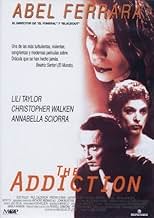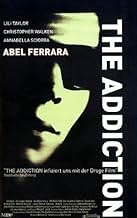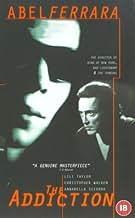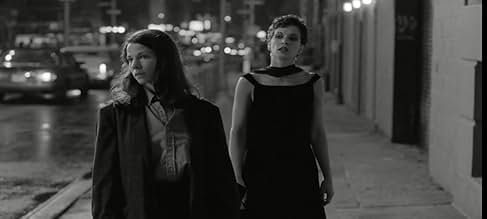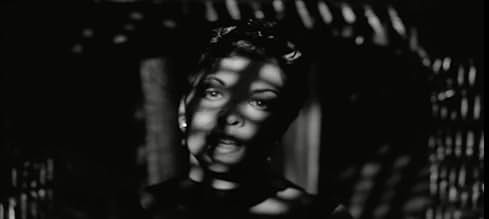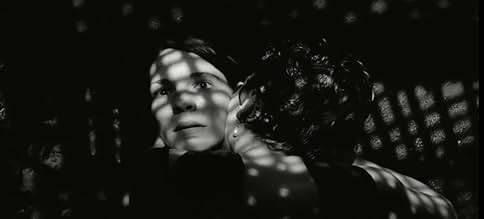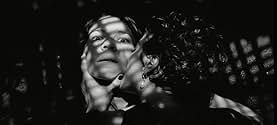A New York philosophy grad student turns into a vampire after getting bitten by one, and then tries to come to terms with her new lifestyle and frequent craving for human blood.A New York philosophy grad student turns into a vampire after getting bitten by one, and then tries to come to terms with her new lifestyle and frequent craving for human blood.A New York philosophy grad student turns into a vampire after getting bitten by one, and then tries to come to terms with her new lifestyle and frequent craving for human blood.
- Awards
- 5 wins & 4 nominations total
Jamal Simmons
- Black's Friend
- (as Jamel 'RedRum' Simmons)
Robert W. Castle
- Narrator
- (as Father Robert Castle)
- …
Michael A. Fella
- Cop
- (as Michael Fella)
Louis Katz
- Doctor
- (as Dr. Louis A. Katz)
Frank Aquilino
- Delivery Man
- (as Frank 'Butchy the Hat' Aquilino)
Nicholas De Cegli
- Cabby
- (as Nicholas Decegli)
- Director
- Writer
- All cast & crew
- Production, box office & more at IMDbPro
Featured reviews
The Addiction (1995)
*** 1/2 (out of 4)
Student Kathleen Conklin (Lili Taylor) is walking home when Casanova (Annabella Sciorra) pulls her into a dark alley and bites her neck. Over the next few days Kathleen feels herself starting to change and quickly she grows an addiction for blood.
Abel Ferrara had a number of films that showed drug addiction including BAD LIEUTENANT, which he made a few years before this one. That film showed the addiction of heroin (and other things) and perfectly showed the downfall of what the drug could do. THE ADDICTION in many ways is another film about heroin but the difference is that it is turned into a vampire film. There have been countless vampire films over the years but leave it to Ferrara to turn the genre upside down and do something original.
As I said, the main character here is a vampire and shows an addiction for blood but it's easy to see that you can look at it the same way you would a heroin addiction. The various withdraws that Kathleen goes through are the same that you'd see for heroin but the director shows it through the eyes of a vampire. I must admit that I was really shocked to see how well the connection worked and there's no question that Ferrara milks it for all it's worth.
Even more impressive was the B&W cinematography, which is without question some of the greatest that you'll ever see. The cinematography really becomes its own character here as the director creates an incredibly thick and depression atmosphere. The decision to make this in B&W was extremely wise and it really pays off because it really does feel as if you're watching dead people move around in their world. The perfect use of rap music on the score just adds to the atmosphere and it really pays off.
Of course, another major aspect are the performances with Taylor delivering a striking character. I was really impressed with the actress because she really does a fantastic job at playing the various stages of the addiction. Seeing how she constantly changes throughout the film shows what a talent Taylor was and it's certainly unforgettable and deserves much more attention. Christopher Walken has an extended cameo here and does a wonderful job as well. The supporting players are all extremely effective in their parts as well.
THE ADDICTION isn't your typical vampire film but that's what makes it so special. The film demands that you pay close attention to everything going on but Ferrara has created a really dark and interesting world for these characters to live in and the film is highly recommended.
*** 1/2 (out of 4)
Student Kathleen Conklin (Lili Taylor) is walking home when Casanova (Annabella Sciorra) pulls her into a dark alley and bites her neck. Over the next few days Kathleen feels herself starting to change and quickly she grows an addiction for blood.
Abel Ferrara had a number of films that showed drug addiction including BAD LIEUTENANT, which he made a few years before this one. That film showed the addiction of heroin (and other things) and perfectly showed the downfall of what the drug could do. THE ADDICTION in many ways is another film about heroin but the difference is that it is turned into a vampire film. There have been countless vampire films over the years but leave it to Ferrara to turn the genre upside down and do something original.
As I said, the main character here is a vampire and shows an addiction for blood but it's easy to see that you can look at it the same way you would a heroin addiction. The various withdraws that Kathleen goes through are the same that you'd see for heroin but the director shows it through the eyes of a vampire. I must admit that I was really shocked to see how well the connection worked and there's no question that Ferrara milks it for all it's worth.
Even more impressive was the B&W cinematography, which is without question some of the greatest that you'll ever see. The cinematography really becomes its own character here as the director creates an incredibly thick and depression atmosphere. The decision to make this in B&W was extremely wise and it really pays off because it really does feel as if you're watching dead people move around in their world. The perfect use of rap music on the score just adds to the atmosphere and it really pays off.
Of course, another major aspect are the performances with Taylor delivering a striking character. I was really impressed with the actress because she really does a fantastic job at playing the various stages of the addiction. Seeing how she constantly changes throughout the film shows what a talent Taylor was and it's certainly unforgettable and deserves much more attention. Christopher Walken has an extended cameo here and does a wonderful job as well. The supporting players are all extremely effective in their parts as well.
THE ADDICTION isn't your typical vampire film but that's what makes it so special. The film demands that you pay close attention to everything going on but Ferrara has created a really dark and interesting world for these characters to live in and the film is highly recommended.
The Addiction is one of the more thoughtful films about vampirism available today.
While the film is incredibly thoughtful, with loads of subtext at every corner, it borders, and sometimes crosses into, pretention. There are times where the narration is attempting to add subtext, but it's so heavy-handed that the film loses sight of the fact it's a horror film. I'd argue it's thought piece first and horror film second, honestly. Maybe that makes it even more frightening.
Christopher Walken is wonderful, and Lili Taylor does a fine job, as well. The choice to shoot the film in black and white was a great idea, as well. There's a real focus placed on the ideas the film is pursuing.
Even though the subject of the horror in this film are vampires, the movie is truly describing humanity.
While the film is incredibly thoughtful, with loads of subtext at every corner, it borders, and sometimes crosses into, pretention. There are times where the narration is attempting to add subtext, but it's so heavy-handed that the film loses sight of the fact it's a horror film. I'd argue it's thought piece first and horror film second, honestly. Maybe that makes it even more frightening.
Christopher Walken is wonderful, and Lili Taylor does a fine job, as well. The choice to shoot the film in black and white was a great idea, as well. There's a real focus placed on the ideas the film is pursuing.
Even though the subject of the horror in this film are vampires, the movie is truly describing humanity.
'The Addiction' is one of the most original vampire movies ever made. In fact, I can't think of another one quite like it. Abel Ferrara has made some strange and disturbing movies in his time, and this one is as strange and disturbing as any. Lili Taylor ('I Shot Andy Warhol') is brilliant as a troubled, soul searching philosophy student who has an unexpected and life-changing encounter with a mysterious stranger ('Cop Land's Annabella Sciorra). Dark, deep, sometimes blackly humorous, and frequently too obscure for its own good, this can be heavy going at times, but is never less than interesting. Christopher Walken, who did some superb work for Ferrara in his classic 'The King Of New York', has only a cameo here, but what a cameo! Walken is terrific and unforgettable. The rest of the supporting cast includes 'The Sopranos' Edie Falco and (briefly) Michael Imperioli, Paul Calderon ('Girlfight'), and Kathryn Erbe ('Stir Of Echoes'). This is a unique movie that will be appreciated by those with an open mind and preference for "difficult" viewing. Recommended.
Abel Ferrara's moody, allegorical vampire tale makes fascinating and pointed statements on sin and redemption, spirituality and the nature of good (there's precious little of it) and evil (no one is safe from it). And unfortunately, but not surprisingly, it was relatively ignored in America.
Lili Taylor gives a brooding, glib and haunting central performance as Kathleen Conklin, a New York University grad student who is pulled into an alley and bitten by a seductive female vampire (Annabella Sciorra), from which she emerges uncontrollably drawn into a world of violence and insatiable cravings for human blood. Ferrara's irredeemable urban hell landscape is more immediate and frightening than a million Transylvanias and by contrasting Taylor's "addiction" to the horrors of the past (war atrocities, the Holocaust) and present (heroine, AIDS), the film has more bite and impact than any fang-bearing, gore or special effects could even attempt to muster up. Nicolas St. John's intriguing philosophical screenplay and Ken Kelsch's gorgeous black and white photography (creating a world solely of light and dark, which is a key element in the plot), are not to be overlooked either.
Call it pretentious for the philosophy references (Sarte, Nietzche...) if you want, but this highly intelligent and disturbing low-budgeter is one of the most accomplished and well-thought out horror films I've ever seen. Don't let over-hyped, attention hogging Hollywood productions like BRAM STOKER'S Dracula or INTERVIEW WITH A VAMPIRE keep you from seeing it.
Lili Taylor gives a brooding, glib and haunting central performance as Kathleen Conklin, a New York University grad student who is pulled into an alley and bitten by a seductive female vampire (Annabella Sciorra), from which she emerges uncontrollably drawn into a world of violence and insatiable cravings for human blood. Ferrara's irredeemable urban hell landscape is more immediate and frightening than a million Transylvanias and by contrasting Taylor's "addiction" to the horrors of the past (war atrocities, the Holocaust) and present (heroine, AIDS), the film has more bite and impact than any fang-bearing, gore or special effects could even attempt to muster up. Nicolas St. John's intriguing philosophical screenplay and Ken Kelsch's gorgeous black and white photography (creating a world solely of light and dark, which is a key element in the plot), are not to be overlooked either.
Call it pretentious for the philosophy references (Sarte, Nietzche...) if you want, but this highly intelligent and disturbing low-budgeter is one of the most accomplished and well-thought out horror films I've ever seen. Don't let over-hyped, attention hogging Hollywood productions like BRAM STOKER'S Dracula or INTERVIEW WITH A VAMPIRE keep you from seeing it.
It's not about vampires, it is about resistance, or lack of it. About what may be right around the corner, about discipline, or about lack of discipline. About being in the wrong place at the wrong time. It can happen to anybody, and it happens to everybody. It's a pyramid scheme.
Beautiful black and white composition by Abel Ferrara tied tightly in a wonderfully creative Joe Delia score. Casting the usual Ferrara/indie suspects: Paul Calderone, Edie Falco, Kathryn Erbe, Lili Taylor, Annabella Sciorra. The theme of the movie presents 4 new questions for every one it answers. Do we have a choice? Can we resist? And just when we think we have it all figured out, Christopher Walken has to show up and throw an entirely new lilt on things.
Such is life.
Beautiful black and white composition by Abel Ferrara tied tightly in a wonderfully creative Joe Delia score. Casting the usual Ferrara/indie suspects: Paul Calderone, Edie Falco, Kathryn Erbe, Lili Taylor, Annabella Sciorra. The theme of the movie presents 4 new questions for every one it answers. Do we have a choice? Can we resist? And just when we think we have it all figured out, Christopher Walken has to show up and throw an entirely new lilt on things.
Such is life.
Did you know
- TriviaKathleen plays on Descartes' famous "cogito ergo sum" (I think therefore I am) by saying "dedita ergo sum" (I do what I'm addicted to doing therefore I am) and "pecco ergo sum" (I sin therefore I am).
- GoofsWhen Kathleen rushes out of her class, her professor shouts after her "Kathryn," despite clearly knowing her well.
- ConnectionsEdited into Gli ultimi giorni dell'umanità (2022)
- SoundtracksBetter Off Dead
Written by Fredro Starr, Sticky Fingaz (as Sticky Fingers), Sonny Cezar
Published by Zomba Music
Performed by Onyx (as ONYX)
Courtesy of JMJ-RAL
- How long is The Addiction?Powered by Alexa
Details
Box office
- Gross US & Canada
- $307,308
- Opening weekend US & Canada
- $46,448
- Oct 8, 1995
- Gross worldwide
- $307,308
- Runtime
- 1h 22m(82 min)
- Color
- Aspect ratio
- 1.85 : 1
Contribute to this page
Suggest an edit or add missing content


